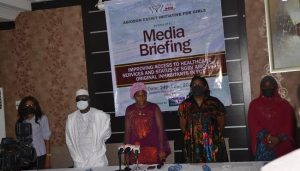Despite domesticating the Violence Against Persons Prohibition (VAPP) Act in Abuja, the Abiodun Essiet Initiative for Girls (AEIG), a non-profit group established to improve the health and well-being of Nigerian women and girls, is worried over the increasing cases of Sexual and Gender-based Violence (SGBV) within the federal capital territory (FCT).

“It’s a known fact that majority of SGBV cases in FCT go unreported and many reported cases are handled with levity,” said Abiodun Essiet, executive director of the organisation during a press briefing held on Thursday, 24th February 2022 in Abuja.
Sadly, she added, many of these unreported cases occurred in rural communities that are largely occupied by the original inhabitants (OI) of the nation’s capital, and these cases were listed among the highest number recorded during the COVID-19 lockdown in 2020.
Combating this menace would require that these people are engaged and empowered to promote their indigenous rights. With this in mind, AEIG is collaborating with eight other organisations to implement a two-year project initiated by the Centre for Human Rights and Civic Education (CHRICED), with support from the Macarthur Foundation.
With its focus on “Promoting the Rights of Original Inhabitants in FCT,” AEIG will be working with the traditional leaders to strengthen the justice system and curb the incessant cases of SGBV, as well as improve the capacity of the OI ward health system committee to accelerate access to efficient healthcare delivery in the six area councils.
Since the beginning of the implementation of this project in November last year, the AEIG boss hinted that her organisation has engaged consultants to carry out a baseline study on response to SGBV, enhanced the capacity of traditional rulers to enforce justice, as well as trained ward heads and managers of Primary Health Care centres to deliver effective services in the capital city.
As part of its demands to address these problems, the group has called on the FCT administration to respect the Abuja declaration and keep to its 15% budgetary allocations to the health sector to take care of the needs of the vast majority of the original inhabitants.
The ongoing industrial action by the Nigerian Union of Local Government Administration Employees (NULGE), and the continuous political marginalisation suffered by these indigenous people are other critical areas that the AEIG strongly believe should be addressed to stem the growing threat of SGBV and foster the rights of the local settlers in FCT.
“For the sake of gender equity and social inclusion,” Essiet requested, “we call on Area Council Chairmen elect in the just concluded FCT area council elections, to consider reserving at least 35% of their appointments for women.”
Mr. Abdullahi Candido, the Chairman, Abuja Municipal Area Council (AMAC) commended the AEIG and other partners for their swift intervention to serve as a voice to the challenges bedeviling the original inhabitants of FCT.
He said the natives need to be assisted in so many ways including access to proper education, security, and other livelihoods sources to confront the burden that FCT has brought upon the people.
This is important, according to him, because if these people are not supported to equate in the scheme of things and are allowed to be in a disadvantaged position, “the future might be bleak.”
By Etta Michael Bisong, Abuja
